Fanfic author, Entrapdak goblin, Dumpsterfire. she/her
Don't wanna be here? Send us removal request.
Text
New fic. Oops. I'm obsessed with these mafia boys.
0 notes
Photo










This was so much fun. A good excuse to mash up a lot of my Entrapta sketches. I hope you all enjoy.
1K notes
·
View notes
Text
Hordak’s Hair Symbolism Final
Of course, I would see a correlation between Hordak’s hair and his state of mind. And two scenes stood out for me and they are both beautiful.
Let’s start.

For most of the season, Hordak’s hair is slicked back, more so not than it was in the first season.

Because he’s been recondition back into a clone without any individuality, but with fractions of memory of Entrapta and his time in the Fright Zone.
That is until he begins breaking the programming again.

A little forelock of hair breaks loose from it’s neat sleek appearance. Look at this image, remember it. It will be super important later.

It becomes even longer when he outright attacks Horde Prime.

It goes back to being slick once Horde Pimr takes over his body, but let’s look at a precious memory.
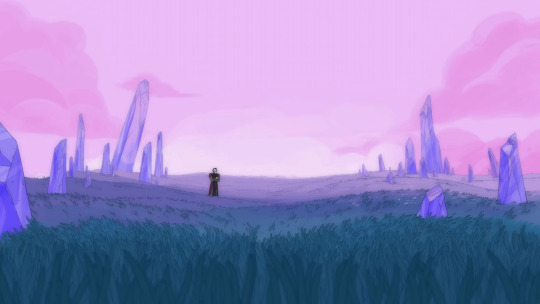

In this image, his hair has that single forelock loose when he’s holding baby Adora.

Unless Noelle confirms or debunks this, I sincerely believe that the moment that Hordak discovered Baby Adora, was when he first went against his indoctrination.
We really don’t know how he found Adora. Was she just lying on the grass as if abandoned? Did someone hand her to him? We don’t know unless Noelle shares that information.
When Hordak was abandoned by Horde Prime, he followed his programming and indoctrination to do everything to appease Horde Prime and return to his side. Finding a baby, saving her, would so nothing to fulfill that objective.
Yet, he did! Saving Adora, bringing her to Etheria was what jump started the events of the series and put him on the path of self-determination and independent thought as he had set her on the path of becoming She-Ra and saving the Universe.
It wasn’t the full Hordak Flashback episode I was hoping for, but this was beautiful.

146 notes
·
View notes
Text
obsessed with the religious/cult undertones with horde prime and his clones....I love that it shows how religious indoctrination and brainwashing are used in the service of imperialism and as a way to justify it. I also appreciate how the clones, who have had certain ideology drilled into them, are regarded with some amount of sympathy by the narrative. after all, if they don’t have access to information outside of their insular community they might not realize the horror of what they are doing. but at the same time, that doesn’t minimize the damage caused by their actions. I really enjoy how the security and pride of belonging to a community (in this case, the hivemind) are what keep the clones submissive and unquestioning. furthermore, when one of them learns something that makes them question their faith, they can simply be reconditioned. of course, when wrong hordak escapes the cult and discovers that it is completely based on lies, he is forced to grapple with the truth and that causes him to reject everything he has previously been taught.
I also really enjoy how it seems to be specifically referencing christian fundamentalism. I’m no religious expert but I noticed stuff like how the reconditioning process was like a baptism in that it involved submerging oneself in liquid before being reborn. the rhetoric of how suffering was necessary to obtain perfection seems really similar to fundamentalist christian ideals. and then when wrong hordak discovers that his entire ideology is built on lies because entrapta explains to him what really happened and tells him “data never lies” that’s very similar to how fundamentalist christians will deny things that can be factually proven, like the age of the earth, because it conflicts with their beliefs. so someone raised in that environment might not know that what they believe is actually false until they escape that environment. I just think it’s a sophisticated and excellent exploration of cults and weaponized religion.
432 notes
·
View notes
Text
While I would have dearly loved for Hordak to have had more screentime, perhaps even more interaction with the Alliance, during season five, I deeply appreciate Wrong Hordak and what his inclusion allows us to discern regarding the clones and, in a somewhat indirect way, Hordak.

Wrong Hordak essentially serves to provide us viewers with a demonstration of a Horde clone’s default way of interacting with the world. We fully appreciate the hivemind when he is disconnected from it and, through his zealous ramblings, come to understand that, hivemind or no, Horde clones are firmly indoctrinated in a loving worship of Horde Prime.

They seek to remain close to Prime, validate themselves through Prime, and praise all of Prime’s endeavors, including galactic conquest.
So: WH, cute as he is, actually has fairly unfortunate morals. Faced with a situation involving a planet getting absolutely destroyed by Prime, he would likely be quite in favor of it. Vocally supportive of the whole ordeal, in fact, despite appearing to be quite a nice fellow in all other aspects.
And while that’s a bit chilling to think about, it does make an important point: WH believes these things not because he is a naturally evil person, but because he has been programmed to believe them.

Now, once removed from the hivemind and given a stable support system, along with relevant information, WH is able to separate himself from Prime, form a healthy new identity, and cease believing the terrible things he was originally programmed to believe.
This marks the key difference between WH and Hordak and potentially gives us some significant insight into Hordak’s unfortunate activities on Etheria.
WH, cut off from the hivemind, able to rely only on indoctrination, is soothed in his panic, adopted into a new family, and gently nurtured to become a new, less-imperialist individual. He is essentially guided into a new life by a relatively stable support network.

Hordak, as far as we know, never has this luxury. Hordak lands on Etheria in the throes of his illness, experiences the disconnect from the hivemind, and is likely just as panicked and lost as WH; he, however, never receives that gentle nurturing. He truly only has his distress, his pain, and his programmed indoctrination to rely on.
If, like WH, Hordak is desperate to return to the peace and security of the hivemind, to return to validation and belonging among his brothers, then, without alternative guidance, he can only attempt to do so using the information available to him. That information is limited to total love and worship of Horde Prime.

And so this is how Hordak becomes a dictator: by mimicking this indoctrinated image of Prime. This is the only example of strength and success and victory that he knows, and so this is what he recreates on Etheria (with some alterations as he gains individuality in his separation).
Give the situation a few decades, add on the pain of chronic illness alongside the ever-worsening fear of failure and ultimate rejection, and one can see how Hordak might grow into the bitter, angry individual we meet in early seasons.


This is the value of WH: he shows us that a loving support system is the difference between an indoctrinated clone becoming a cute, apron-wearing cook and an indoctrinated clone becoming an evil dictator. After all: the morals, the education, even the DNA they start with are all the same. The key difference is that WH has help, while Hordak suffers through years of isolation, illness, and fearful frustration all by himself.
It’s an illuminating observation, but also a sad one: perhaps, if Hordak had had someone to guide him and look after him all those years ago, the terrible war for Etheria would have never happened. And perhaps he would have been a happier man.
6K notes
·
View notes
Video
All of the Entrapdak moments from She-Ra Season 5! Stay winning kings
2K notes
·
View notes
Text
Honestly, it's not even the Entrapdak vindication that is so incredible.
It's the clone vindication. The morality vindication. The proof that no, the clones aren't some sort of evil monsters, that Hordak is not an irreparable space imperialist.
It's the undeniable demonstration of the cultish, indoctrinated, absolutely terrifying lives they lead.
It's the cracking of a clone's joints when Prime takes control of his body on a paltry whim. It's knowing that he uses them to lengthen his lifespan.
It's the chanting and the purification screaming and the peaceful, ignorant security of the hivemind.
It's knowing, without a doubt, that Hordak isn't some sort of naturally evil bastard, but rather a man tormented and deeply wounded by a sick, twisted doctrine.
what I'm saying is: Hordak antis, you were wrong
860 notes
·
View notes
Photo
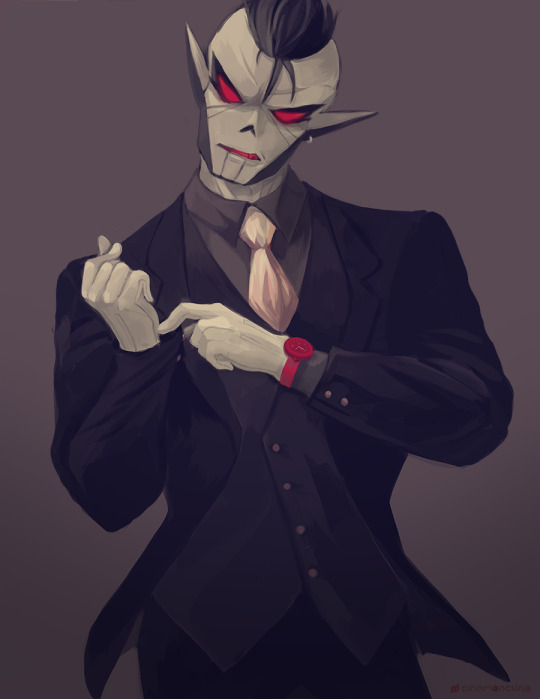
Something different for a change…
Hordak in a suit?
2K notes
·
View notes
Video
youtube
I know him || Double Trouble and Prime (She-ra animatic)
64 notes
·
View notes
Text
Hordak in 3 different "potential s4 au" fics
My "A Research Endeavour": Red
@b-dazzled's "Green is the New Red": Orange
@cruciferousjex 's "The Attendant": Green
We did it, guys. We made him into a traffic light.
35 notes
·
View notes
Text
Horde Prime is a Tactile Villain
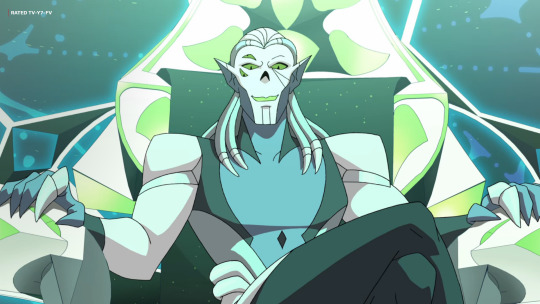
It’s been a while since I did one of these so here I am back to form with this.
Another thing about Horde Prime that is discomforting about him is he’s very tactile - of or connected with the sense of touch.
Long Post Below
Keep reading
81 notes
·
View notes
Text
I’ve been thinking about choice again. In relation to Hordak, of course.
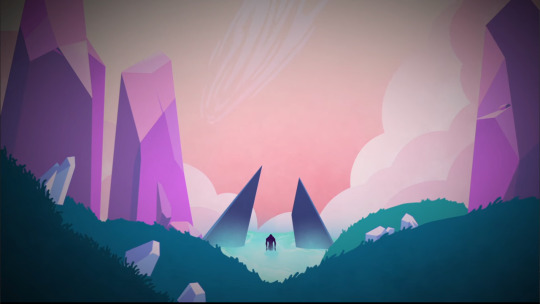
It’s been debated to death, but I still think about people’s insistence that Hordak confirmed himself an evil, irredeemable person once he decided, upon arrival, to conquer Etheria rather than living peacefully. I think about the nature of this choice from our human perspective and his clone perspective. I think about how these perspectives differ not only in terms of morality, but in terms of what making a choice really means. And I think of how all of this affects my personal judgement of him.
To most of us, the moral difference between “live peacefully” and “conquer the innocents” seems very clear. It seems a natural, obvious distinction, but something that I often consider is whether this distinction seems obvious because it is an irrefutable, natural law, or because of the heavy social conditioning each and every one of us, as fairly average human beings, undergoes from the moment we are born.
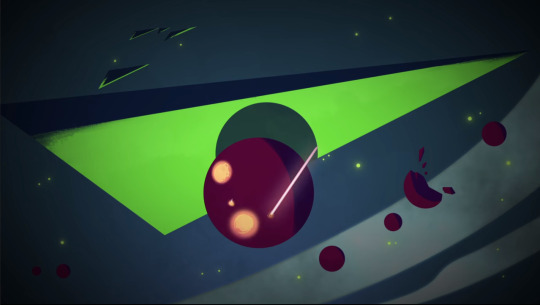
I think of our conditioning, which is pro-social and generally geared towards empathy, compassion, and equality, versus Hordak’s. I don’t know what Hordak’s conditioning was like. Not really. Not with any true certainty or accuracy (though I can make some really disturbing guesses). But I can pretty much guarantee that it wasn’t anything like ours. We are social animals raised to live in cooperative societies. Hordak is a manufactured clone soldier made to fight someone else’s war.
And I think that’s an important thing to consider, y’know? I think there is a difference between an individual raised with our understanding of good and evil choosing to do what Hordak did, and an individual raised as he was doing the same. Being taught, extensively, that an action is evil and doing it anyway is different from being taught that the same action is expected and acceptable before choosing it. That, to me, is the huge difference between us and Hordak, and indeed between Hordak and characters like Shadow Weaver and Catra: characters who had some level of socialization and guidance that adheres to our idea of morality rather than whatever fuckery Horde Prime instills in his clones.
Going further along this train of thought, I often consider what Hordak internally understood to be valid options. To you and me, “live peacefully” and “conquer the innocents” are, besides being morally opposite, both workable choices. “Workable” meaning that both can result in a stable, livable situation with an acceptable quality of life. Essentially: neither one means instant death when chosen.
Is this true for Hordak?
In my opinion: no. Knowing what we know about him, knowing where he comes from and whom he answers to, it’s not.
From Hordak’s perspective, whether due to conditioning via socialization or just plain programming, failing to serve Horde Prime in a satisfactory manner isn’t just dishonorable or shameful. It’s akin to death. And I don’t just mean in the practical “if you’re useless, you’re thrown away to die” sense, though we physically see that during his backstory. I mean in the mental, emotional sense.
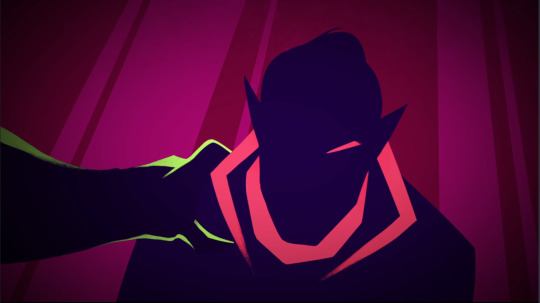
Hordak makes it very clear that, in his mind, being useful to and valued by Prime is imperative for feeling at peace with himself. He needs to be accepted by Prime because otherwise his life isn’t just worthless, it’s… hm. I don’t truly know how to express the severity of it. It almost has the air of a deeply religious person being rejected by their god. Especially when one notes how reverently Hordak speaks of his Brother, how he borderline worships him. Essentially, failing Prime carries the weight of intense moral, almost spiritual failure. Which makes sense when considering that Hordak is a clone manufactured with the sole purpose of serving Horde Prime.
This is why I don’t buy the whole “he had a choice” argument as truly valid. It seems logical on the surface, but I think that once one really understands Hordak’s mindset, one can see that, to him, there isn’t really a choice at all.

And I understand that this might be hard to really grasp. Many of us, during our socialization, are taught again and again that we have many choices, many options in life. That as long as we try hard and apply ourselves, we can direct the courses of our lives. We can be whatever we want to be. Make of our lives whatever we wish. Hordak likely never received this sort of education. In fact, he likely never received any encouragement in making choices and directing his own life, if Horde Prime’s outburst upon hearing of Hordak’s will and self-naming is any indicator. Hordak wasn’t born into a life of possibilities. He was born a tool, manufactured to perform a task for his master.
To Hordak, there is one way to live life, one direction that leads to an acceptable existence: servitude to his Brother. Hence why he elects to conquer Etheria. And why he makes the abysmal, life-threatening decision to return to Horde Prime rather than… well, honestly, literally anything else would have been a safer bet.
The idea of his “choosing” to conquer Etheria rather than living a civilian life is a bit of an illusion. It exists to us, but to him, a defective clone woefully trapped in whatever abusive web Prime has woven, it’s simply not there. To Hordak, the choice is between “impress Brother” or “die in disgrace” and thus not a real choice at all.

Now, it is worthwhile to note that there is one point in time where Hordak does suddenly see a real choice, a way to live life that is outside of what he previously thought possible. It is perhaps the first time he is able to see a life for himself that does not include his Brother, and it is all thanks to Entrapta.
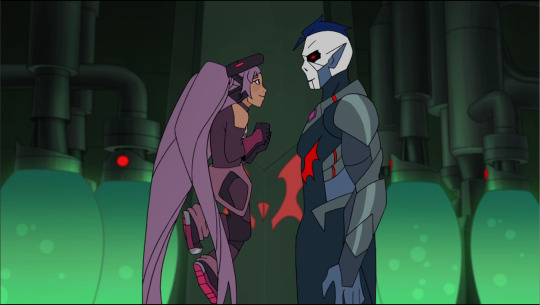
Entrapta, with her companionship, doesn’t play that stereotypical “turn the evil man good with the power of love” role. What she does is provide a real, true choice. Entrapta opens Hordak’s eyes to the possibility of living a life, a good life, without Horde Prime’s involvement. She essentially alters Hordak’s notion of what is and isn’t a viable existence. Through her companionship, he is able to entertain the notion that it is possible to be worthy and live happily without Horde Prime’s blessing.
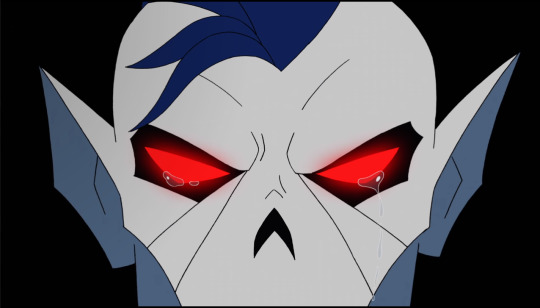
Well. Until he believes that she is dead. Once he believes that, the option is null and void, and so he falls back to the only understanding of life he’s ever really had, returns to his Brother, begs him for acceptance, and loses himself to mental violation and erasure.
Because again: without an outside person’s help, Hordak really only has his own conditioning to go on, and that conditioning is very specific regarding what is and isn’t a viable life. Despite how the situation appears to us, the tragic fact of the matter is that said conditioning does not really afford Hordak truly equivalent options.
And that is such a major reason why I just can’t see him as an irredeemable monster: he still hasn’t had the chance to make a real, honest choice.
423 notes
·
View notes
Text
I’ve recently seen some talk of how season four saw Hordak somewhat backslide in his character development. I’d like to discuss why I disagree with that, chiefly because I feel it stems from a misunderstanding of the nature of his character arc.
There is this sort of pervasive understanding that a “redemptive” character arc requires a character to go from “bad person” to “good person.” While Hordak wasn’t anywhere close to “good” in season three, he had somewhat graduated to “not currently murdering anyone.” Rather than improving from that, season four saw him transition into “dang, look at Salineas burn!”, so it’s understandable why some might say that Hordak has gone backwards in his development.
The thing of it is, Hordak’s arc isn’t about learning to be a good person. It’s not about understanding that what he’s done is wrong. It’s not about making amends to Etheria and fighting on the side of good.
Hordak’s arc is about learning to just… be a person. His own person. It’s about learning how to function and live outside of the Horde Prime-centered framework he’s been trapped in his whole life. It’s about developing enough self-worth to allow him to find peace without Prime’s validation. It’s about personally connecting with someone other than Prime. Taking all of that into account, I find that season four, despite bringing Hordak to the lowest point we’ve seen so far, actually advanced his development quite dramatically.

I say this because the majority of what Hordak does in season four (the conquest, the taking to the battlefield, the myriad explosions) happens not just because he’s trying to prove himself to Prime, but because he’s coping with the loss of Entrapta. Not coping well, obviously, but still coping, and the fact that he alters his behavior and dwells so much first on her supposed betrayal, and then on her apparent death, shows that he actually cares about something other than Horde Prime.
His moments of heightened violence, rather than representing a backslide in development, mark progress because they show that Entrapta’s loss meant something to him. There was a connection, a wished-for life, that he lost and grieved for, and the fact that he was able to conceive of a different life for himself is huge. For a manufactured clone soldier pathologically dependent upon his progenitor, it is astronomically important.

Hordak’s actions and their underlying emotions show that yes, he is capable of wanting and being something other than Horde Prime’s general. He is capable enough of it that the loss of the opportunity drives him into various stages of grief and rage. He is capable of imagining a new life, and he is capable of forming a personal connection outside of Prime that is truly meaningful to him. And we’re able to confirm all of this because Prime himself tells us, remarking that, at one point, Hordak didn’t want to be retrieved.
The fact of it is that, with Entrapta’s help, Hordak was beginning to see new possibilities for himself. Beginning to see a new life he could live. With her loss, that new life is taken from him, and he doubles down on his efforts to please his brother because, as far as he is concerned, that’s all he has left. But the conception of and the desire for that new life remain, and once Hordak breaks down courtesy of Double Trouble’s reveal, they resurface and are confirmed.
In the end, it’s not feel-good growth, but it is growth, and it makes sense when one looks at Hordak’s arc not as one of morality, but as one of independence and self-actualization.
415 notes
·
View notes
Photo




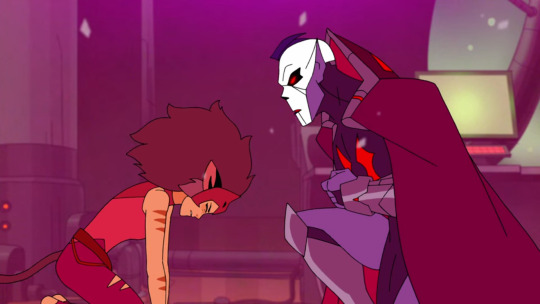


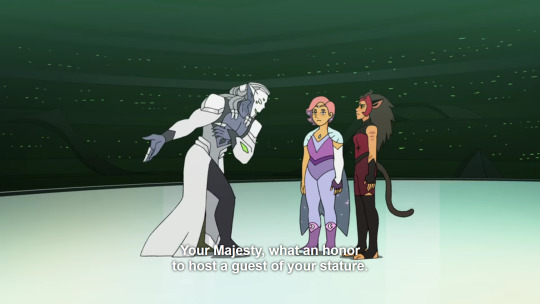
Hordak and Horde Prime comparison.
So one thing that stands out is that Prime’s got way less steps. I think this is because he presents himself as a friendly and benevolent patriarch rather than a towering conqueror, and to be closer so he can grope everyone’s faces. (or possibly this is his “travel-size” throne room?)
Meanwhile, Hordak could not pull off “friendly and benevolent” to save his life.
433 notes
·
View notes
Text
OOF
Well. It’s been a week and a half. I think I’ve recovered enough to put my feelings into coherent order. Maybe. So: Hordak’s reformatting.
I sobbed. Hard. Not at first, mind you. I’d prepared myself, you see? I knew it was going to be bad when he reunited with Prime. I expected humiliation, both emotional and physical. I expected cruel dismissal. I was ready for ridicule, beatings, jailing: the standard fare. I’m an incorrigible pessimist; I expected the worst.
But I didn’t know he could do that. I didn’t know that anyone could do that to Hordak. I didn’t know you could just.. just reach in a violate him like that. I didn’t know! I didn’t know that… that that horror was a possibility. That that was something that Hordak was risking.
But it just emphasizes how sick, how desperate Hordak is inside, doesn’t it? He must have known that this could happen. He knew his brother, what he was capable of. He knew, yet he prostrated himself and begged and pleaded and tried so hard to win that coveted favor back.

Look at this. Look at this goddamned mess. He’s wounded from the fight with Catra, suffering without the crystal properly powering his armor, not even able to stand, but he tries. He tries to convey his effort, tries to convey how hard he’s toiled to gain back this esteem he needs so badly. And it’s just nauseating to watch.
I know what he’s been through. Y’all know what he’s been through. The isolation, the chronic pain, the years of failures eating away at his meager self-confidence. The loss of Entrapta. We know how arduous it has been, how it’s culminated in this one desperate attempt to plead his case, and it’s nauseating to watch because while he’s on his knees, Horde Prime is just… unmoved.
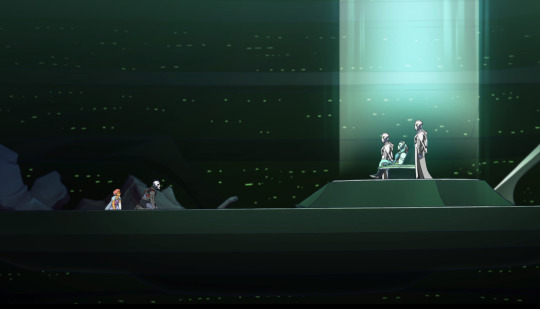
Clean, cold, disinterested. Detached. For all of Hordak’s pained effort to impress, to make that connection, Horde Prime treats him like a passing curiosity, a little oddity to casually examine before ultimately deciding it unworthy.
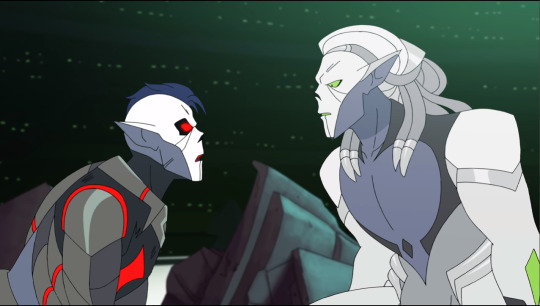
The juxtaposition of them is so jarring: Prime calm and impeccably groomed and nonchalant, Hordak a scruffy, bedraggled mess, positioned like a prisoner, like Glimmer, rather than like a proud general returning home. And it just gets worse as Hordak continues, as Prime starts to chafe at actions Hordak clearly did not have his permission to take.
This is where it really distresses me, friends and neighbors: this moment when Hordak truly realizes that he’s made a grave error, that Horde Prime sees his efforts not as faithful tribute but as repulsive heresy. The moment he starts to back-pedal, proclaim his devotion more and more frantically. This is where his eyes go wide, and he starts to tremble, and you can feel his heart start to race, panicked and thudding. I often wonder if he has an arrhythmia because of his condition and if he’s fighting syncope right now fighting to stay stable while pleading This is where the desperation peaks, because he knows what’s coming, doesn’t he? He knows what Prime can do. You and I are about to learn, friends and neighbors, but he knows.

He knows that Prime can violate him in a way none of us on this here planet Earth can fathom, because we can’t be plugged into, our minds read like ragged open books. But he can. He can sense the danger, sense the final crumbling of everything he’s worked for, the futility of his pleading. He can feel those vulgar hands on his face, caressing and probing, a warning of what’s to come. He knows what can happen, what’s going to happen, yet he can’t move away. He’s too wounded and too… too devoted. Too dependent. Those hands, that voice, that awful man are all his undoing, but he needs that deceptive touch.
And this is the moment where I honestly don’t see how people can’t understand what Hordak is, how they can continue to think him a simple imperial warlord. How can they think that when he’s brought himself to this? How could they think that when he could have just stayed on Etheria. He could have taken it over. He could have ruled unchallenged, millions of hapless victims at his feet, the most powerful man on a magical planet bent entirely to his will. He could have done that. He could have just not built that portal. He could have… he could have been that supposed warlord.
He could have been with Entrapta. We know now that he loved her, loved her enough that, for a time, this sick devotion to Prime had waned, and he might have even broken free. He could have stayed on Etheria, hidden from his brother, ruling all with Entrapta by his side.
Instead, he’s a miserably terrified, shaking wreck, doomed to destruction by this narcissistic horror, because it was never about ruling anything. It was always about filling that internal emptiness with the only thing that mattered: brother’s esteem. Brother’s pride. Perhaps brother’s equivalent of love.
But brother feels no such thing, appreciates no such thing, cares for no such thing. Brother, apparently, doesn’t believe his lesser siblings should have the free will, the gall, to do anything that he hasn’t personally approved. Our dear brother Horde Prime sees Hordak’s dedicated efforts and toil as an abomination. And so, we get to watch what Hordak was desperately trying to avoid: his erasure.

So that’s it. That’s the scene. What did I get from it?
I got the ultimate confirmation that, rather than being the warlord instigator of Etherian conquest, Hordak is a hollow, suffering thing so desperate for his progenitor’s validation, that he will march himself straight to his own death to get it. I got the knowledge that all of the misery on Etheria stems not from territorial ambition, but from deep pain.
And I got tears, friends and neighbors. As I’m sure y’all know.
884 notes
·
View notes
Text
Me: "I'm in mourning."
Them: "Oh no! What happened?"
Me: "A childrens cartoon hurt me. Bad."
#she ra netflix#i'm not okay#entrapdak#Green is the new red#I'll never look at pie the same way again
85 notes
·
View notes
Text
What a happy boi.
Hordak Smiling: The Sequel!






Hordak Smiling: Part 1
1K notes
·
View notes